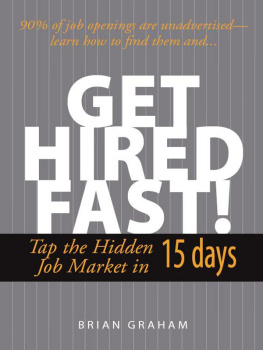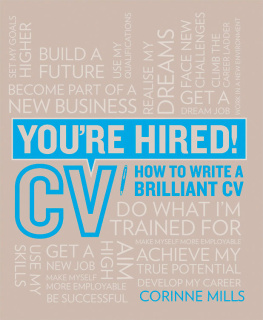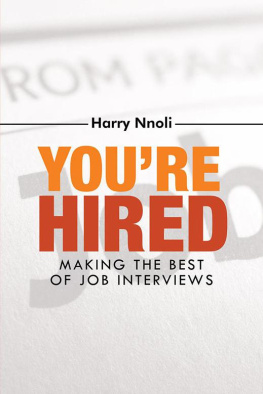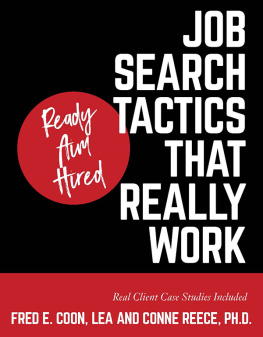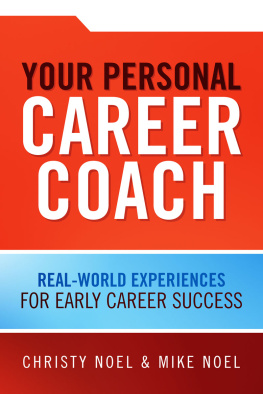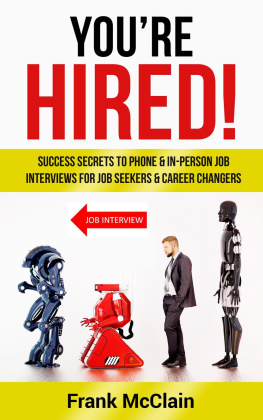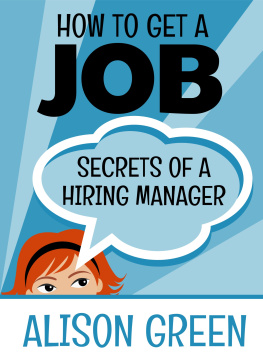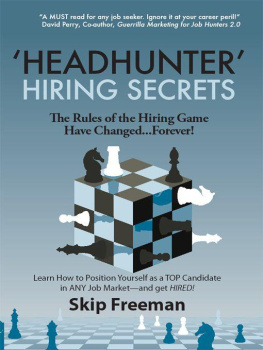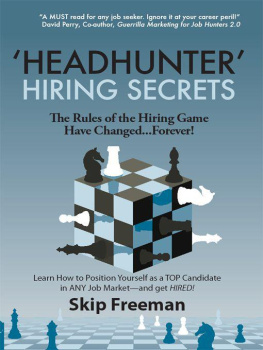All rights reserved.
To those along my path who recognized that still waters run deep. This ones for you.
Introduction
You worked hard in college and earned a great education. Youve been in the workforce for a couple of years, or even decades, and gained valuable experience. Perhaps you even got promoted recently. You know you are a skilled professional with a lot to offer. Youve polished your resume and have been applying for new positions over the past several months in hopes of landing an exciting new opportunity. But despite all your efforts, not one employer has presented you with an offer. Not. One.
Perhaps youve gotten a few phone calls or interviews, but that was where it ended. Each time, you received a polite email informing you that another candidate was chosenwith no explanation as to why. You just cant seem to convert all your hard work into an actual offer. All those late nights spent applying to openings and preparing for interviews, and nothing to show for it. Each time, youre left wondering what you did wrong, what you could be doing betterand worst of all, why someone else was better than you.
Youre feeling frustrated and questioning your worth. Youre thinking, Im smart, capable, and motivatedwhy doesnt anybody want me?! Why am I not good enough?
You are not alone.
A recent study by Glassdoor.com found that for any given opening, 98 percent of applicants never hear back from the hiring agency. That means only 2 percent do. Thats a pretty staggering statistic.
Is the job market really so chock full of exceptional candidates that only the cream of the crop stands a fighting chance? Are your credentials subpar? Are you hopelessly undesirable to employers, for reasons youll never even know because no one will just level with you? Or are you making the classic mistakes of a typical ill - informed job seeker?
I dont know you, but I can almost guarantee its the latter.
Quick Fact
Ninety - eight percent of applicants never hear back when they apply. That means only 2 percent do. This book will teach you how to do two things: (1) consistently earn yourself a spot in the 2 percent and (2) carry that momentum through the entire hiring process, landing yourself the offers that you deserve.
Have you ever noticed that the elusive, magical top 2 percent seem to find themselves in that position over and over again? We all have that one friend or acquaintance who always seems to be in demand, whether they are actively looking for a new position or not. When they put themselves out there, they effortlessly land interviews and offers. The kicker? Even when they are satisfied at work and not looking for a new position, headhunters are calling them right and left. What makes them so special? Why are they so sought after?
You might be tempted to think these people are just incredibly talented with unmatched experience, work ethic, and skills. Maybe. Maybe not. I would bet that the number - one skill they have mastered is the job search process itself.
Heres the problem. This whole job - seeking thingyoure doing it wrong. There is nothing lacking in you as a person or as a candidate. The problem lies in how youre going about finding your next position.
Beware of Bad Advice
Sadly, candidates shoot themselves in the foot every day, at every stage of the process. They follow advice from their career counselor, or their friend, or some nugget of generic conventional wisdom, without realizing that the advice (nine times out of ten) is actually terrible. By applying it, they are inadvertently blowing their chances of getting hired.
There are many career coaches and counselors out there who dispense cookie cutter, counter - productive advice that haunts people for decades. Their guidance may be genuine and well - intended , but its often not applicable in the real world. In fact, it may even hinder a search rather than help it. It is very common for students to graduate college armed with practice interview questions, a resume template, and the results of some clich what career is best for me test, and absolutely no idea how to actually find a job.
A Learned Skill
There are a few dozen classic mistakes, most of which the general public knows nothing aboutand many of which I can practically guarantee you are making. The good news? They can all be easily avoided once you know what they are.
What I have learned throughout my career in the hiring world is that job seeking is a learned skill . And its a skill that anyone can masterincluding you.
What does that mean, exactly? It means you dont have to be the best, the smartest, the most talented, or the most qualified applicant in order to get the interview and the offer. You just need to master the process.
In fact, thats the reason I am writing this book: to help good people like you land the positions that they deserve. If you follow my advice, you will start securing employment offers before you know itby job seeking the right way.
Quick Fact
You dont have to be the most qualified applicant to be selected for a position. You do need to understand what hiring managers really want, so you can use that knowledge to outsmart the system.
Why Listen to Me?
I am a headhunter. I get people hired for a living.
Throughout my professional career, I have placed hundreds of candidates successfully in new positions, and coached thousands in their job searches. I support companies daily in their hiring processes and have collected fifteen years worth of firsthand data on how employers make actual hiring decisions. What criteria they look at, what they consider to be red flags, what they like and dont like, and all the other insider information they never reveal to candidatesI know it all. I hear it all. I live it every single day.
My clients are the companies doing the hiring, so when they choose to hire or reject a candidate, they tell me exactly why they made that decision. Im privy to the truth about why candidates are being turned downand it sure isnt sugarcoated. This priceless information is the missing link for job seekers all over the world. Its the secret information that everybody wants, but nobody gets access to. A company can be honest with me as a third party in the hiring equation, but they are almost never honest with candidates.
Definitions
Client: When I use the term client, it refers to a company that is hiring.
Candidate: When I use the term candidate, it refers to a job seeker.
It is easy for candidates to feel frustrated when they are rejected and the company wont tell them why. If applicants knew why they didnt get offers, they could use the detailed feedback to improve for the next time around. I am here to divulge this inside information, completely unfiltered, from the trenches of an employment agency.
How and why certain candidates get passed over while others get hired is actually completely predictable. When I screen candidates for an open position with one of my clients, I know within the first thirty seconds of speaking with someone whether or not they are going to get hired. Yes, Im serious. There is tremendous consistency in what companies consider to be an ideal candidate, so much so that I instantly recognize it when I see it. Believe me when I tell you that the criteria used to evaluate people is not what you think.


